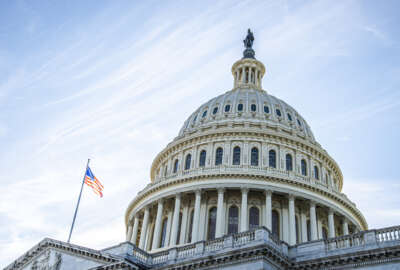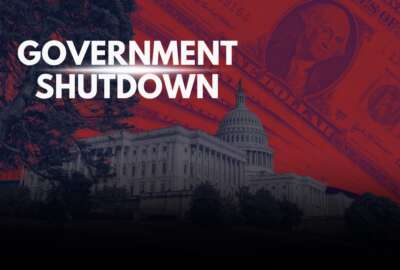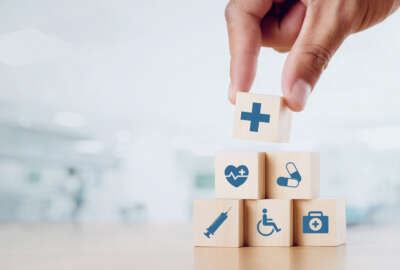After a long wait, federal benefits for more 9/11 first responders
"Anxiety and depression still haunt this population today, 23 years later," attorney Michael Barasch said.
It’s taken a generation, but now federal benefits have become available for first responders harmed during the aftermath of the 9/11 attacks. The money was authorized in last year’s National Defense Authorization bill. Federal News Network’s Drew Friedman joins the Federal Drive with Tom Temin for more details from attorney Michael Barasch of the law firm Barasch and McGarry.
Interview transcript:
Tom Temin Mr. Barasch, good to have you with us.
Michael Barasch Thank you for having me, Tom.
Tom Temin And this is something you have actually been pursuing almost since the day after.
Michael Barasch Yeah, I would say right after that. Before 9/11, I represented injured New York City firefighters and cops, and I lost so many clients that day, so many friends. And then we kept hearing everybody clapping. And we soon realized that 9/11 didn’t end on 9/11. And for the first responders and for all the downtown residents in lower Manhattan, for the guys at the Pentagon, it still hasn’t ended. Not a day goes by without two of my clients dying of 9/11-related illnesses.
Tom Temin Let’s talk about that National Defense Authorization Act. What did it actually say and do and what does this tell us more about what’s available now?
Michael Barasch Let’s start with the Pentagon. For some reason, the responders at the Pentagon weren’t covered by the World Trade Center health program, which is one of the two programs created when Congress passed the Zadroga Health and Compensation Act. And yes, I know that nearly all the people who died on 9/11 were in New York, but it was a terrible name to call it the World Trade Center health program because it completely dismissed the people who died, the people who got sick at the Pentagon and at Shanksville. So it’s still called the World Trade Center Health Program, the second program being the victim compensation fund. Both programs have been permanently extended. We’ll talk about it in a minute. But the health program still needs additional funding. But now at least responders at the Pentagon and at Shanksville still are covered. If, God forbid, they get sick from a 9/11-related illness, which now includes, by the way, 69 cancers and a host of respiratory illnesses linked to the carcinogens in concrete dust and jet fuel.
Drew Friedman Thanks, Michael. And can you talk a little bit about how they get access to that coverage and what exactly the benefit provides for these first responders?
Michael Barasch Okay. Great question. Well, so the first payment is always by your private insurance company. If you’re retired, which many guys and gals are now 23 years later, then Medicare would be your first payment. But if you’re certified with a 9/11 illness and again, there’s so many illnesses that are now presumed linked and please remind me to talk a little bit about the presumption organizations made. Then the health program will pick up all the co-pays, all the deductibles. I’m sure you’ve heard horror stories about people who have insurance, and that insurance just wasn’t enough to cover the care of chemotherapy and cancer treatment. It can cripple a family. So having the health program pick up that additional coverage is just fabulous for the 9/11 community.
Tom Temin How much money is available and what’s your experience been on what it actually costs these responders, you know, for their health care and whatever?
Michael Barasch Well, if they are certified for anything. So, for instance, let’s say they’re in an accident and they break their leg playing basketball or riding a bike. The health program obviously does not cover that, but it does cover the cost of asthma, reactive airway disease, mental illness treatment. I can’t tell you, Tom, how many men and women suffer from PTSD, which I know a lot of people feel is kind of fake, but it’s not fake. These people, I speak to them every single day. And anxiety and depression still haunt this population today, 23 years later. So the cost of these treatments, the cost of medication can be overwhelming. And having the support of NIOSH, the National Institute for Occupational Safety and Health, which oversees the World Trade and Health program, is of critical importance. But no one predicted just how much medical inflation was going to impact the 9/11 community. So we are about $3 billion short for the health program. But ironically, once you’re certified by the health program with a 9/11 illness, then the victim compensation fund will pay up to $250,000 for your cancer, will pay your lost income if you’re ever found disabled due to your illness and God forbid you die of a 9/11 illness, they’ll pay your family on average about $400,000. So it’s kind of a cancer insurance policy for the 9/11 community.
Tom Temin We’re speaking with attorney Michael Barasch, who specializes in 9/11 claims. How many people do you think are left that might be eligible that have not received compensation?
Michael Barasch So, so far, we know that about 120,000 people are in the World Trade Center health program. However, and by the way, I give a lot of credit to the unions for educating their members because they are the vast majority of the health program. Sadly, it’s the civilians, including, by the way, federal employees who were breathing the same toxic dust. Not surprisingly, they’re coming down with the same illness as the dying of the same illnesses, and less than 10% of the civilians are in the program. And to answer your question, how many people? Well, it’s estimated that there were approximately 500,000 people in lower Manhattan exposed to the World Trade Center toxins, probably thousands of others at the Pentagon, and far fewer, of course, at Shanksville. But they’re all eligible, but they have to enroll. And if they enroll, they have to prove that they were there, which isn’t that hard. But every year that goes by, it gets more and more difficult because you have to find your witnesses who can say, I saw Michael, I sat next to Tom. Yes, I know he was working downtown, or yes, I know he was at the Pentagon participating in the recovery and the rescue operations. And that’s why I always tell healthy people, protect yourselves, protect your families. Don’t leave it to your families to try to find your witnesses after you’re gone. And don’t leave it to yourself to do this. If you’ve got a terrible diagnosis that you’ve got stage four cancer, that’s when you want to start the process of finding witnesses. But it’s a non adversarial program. Both of them are non-adversarial. But we’re talking about the federal government. They want to make sure that if they’re giving free health care to people, if they’re giving compensation to people, that these people were really exposed to the toxins either in the World Trade Center or Canal Street or at the Pentagon.
Drew Friedman Now, is it possible that some of these first responders from 9/11 maybe don’t know that some illness that they have is actually connected to those events? And how are you trying to spread awareness that, you know, maybe there is a connection and they can be eligible for these benefits?
Michael Barasch When Congress passed the Zadroga Health and Compensation Act. And by the way, I just have to interrupt myself by telling you it was named after my client, Detective James Zadroga who was with the NYPD. Jimmy died of pulmonary fibrosis at the age of 34. And when they did his autopsy, they found in his lung tissue round glass, asbestos, chromium, lead, benzene. These are all known carcinogens. Well, we showed the results of this autopsy to NIOSH, and they had been doing their own air sampling both at the Pentagon and at the World Trade Center. And they put two and two together and realized, wow, there is a nine to 41% increase in cancers in the 9/11 community, which is considered medically significant. So they said there is a presumption. So if you have if you develop breast cancer, if you develop prostate cancer, which are two of the most common cancers, the most common cancer, of course being skin cancer, because that concrete dust that was in the air when the buildings were burning was had the level of drain out. So if you ever develop cancer any time between now and 2019, you don’t have to prove by having a doctor testify. All you have to do is show you were exposed and you develop cancer. That’s it.
Tom Temin It’s very similar to the approach Veterans Affairs then has taken with Agent Orange.
Michael Barasch Yes, great analogy. And they don’t want it to be adversarial. They want you to make the claim. But so many people aren’t connecting the dots. They might say, my mother had breast cancer before, you know, what could my, I was at the Federal Plaza working at 250 Broadway. How could my breast cancer be related when my mother had it? Or I’m Irish, I have very white skin, fair skin and my skin cancer, likewise, because I was outside all the time. You don’t have to prove it with a doctor. All you have to do, again, prove you were there below Canal Street or at the Pentagon. Prove that you developed this cancer and the government will give you this health care that you deserve and give you a compensation that you’re entitled to.
Drew Friedman Now, we’ve been speaking mostly about the victims who were there on the day of 9/11. But is there anything in this package, in these benefits that’s available to family members, maybe those who have died on 9/11 or following it?
Michael Barasch Well, the people who died on 9/11, frankly, they were covered by the first victim compensation fund, which was created just three weeks after 9/11, and President Bush signed it into law. They kind of rushed it into effect and they created the victim compensation fund, which ended in 2003. I believe it was like 99% of the victims who died that day, their families were taken care of. However, we’ve seen more than 6,000 people that we know of who have died since 9/11 as a result of their toxic exposure. It’s really heartbreaking, as I said. Every day I see two of my clients pass away and it’s not too late for their families to make a claim if they know about it. Which is why I so appreciate you covering this story now and helping me get the word out that it isn’t too late. So if your listeners, we all know someone who lost a family member or who got cancer but who was exposed, please pay it forward. Be each other’s advocate and let them know, hey, weren’t you downtown in Lower Manhattan, weren’t you at the Pentagon? Did you look into this for your family? You want to take care of yourselves? So do this for your family. You’re not taking away from anybody else. As I said, the victim compensation fund has been fully funded by Congress. They did a great thing after misleading us five days after 9/11 when the EPA told us that the air was safe to breathe. Do you remember that?
Tom Temin Sure, but I guess not.
Michael Barasch Still, a lot of people still don’t connect the dots or they think, I smoked cigarettes. My lung cancer is not related to 9/11 exposure. Well, it is presumed link as John Stewart, our hero who got Congress to pass these bills as he famously testified before Congress. Access what you are entitled to know. Don’t let your families go without accessing these benefits.
Tom Temin Attorney Michael Barasch specializes in 9/11 claims. Thanks so much for joining us.
Michael Barasch Thanks for helping me spread the word. I really appreciate it.
Tom Temin And we’ll post this interview with federalnewsnetwork.com/federaldrive. Subscribe to the Federal Drive wherever you get your podcasts.
Copyright © 2024 Federal News Network. All rights reserved. This website is not intended for users located within the European Economic Area.
Tom Temin is host of the Federal Drive and has been providing insight on federal technology and management issues for more than 30 years.
Follow @tteminWFED






